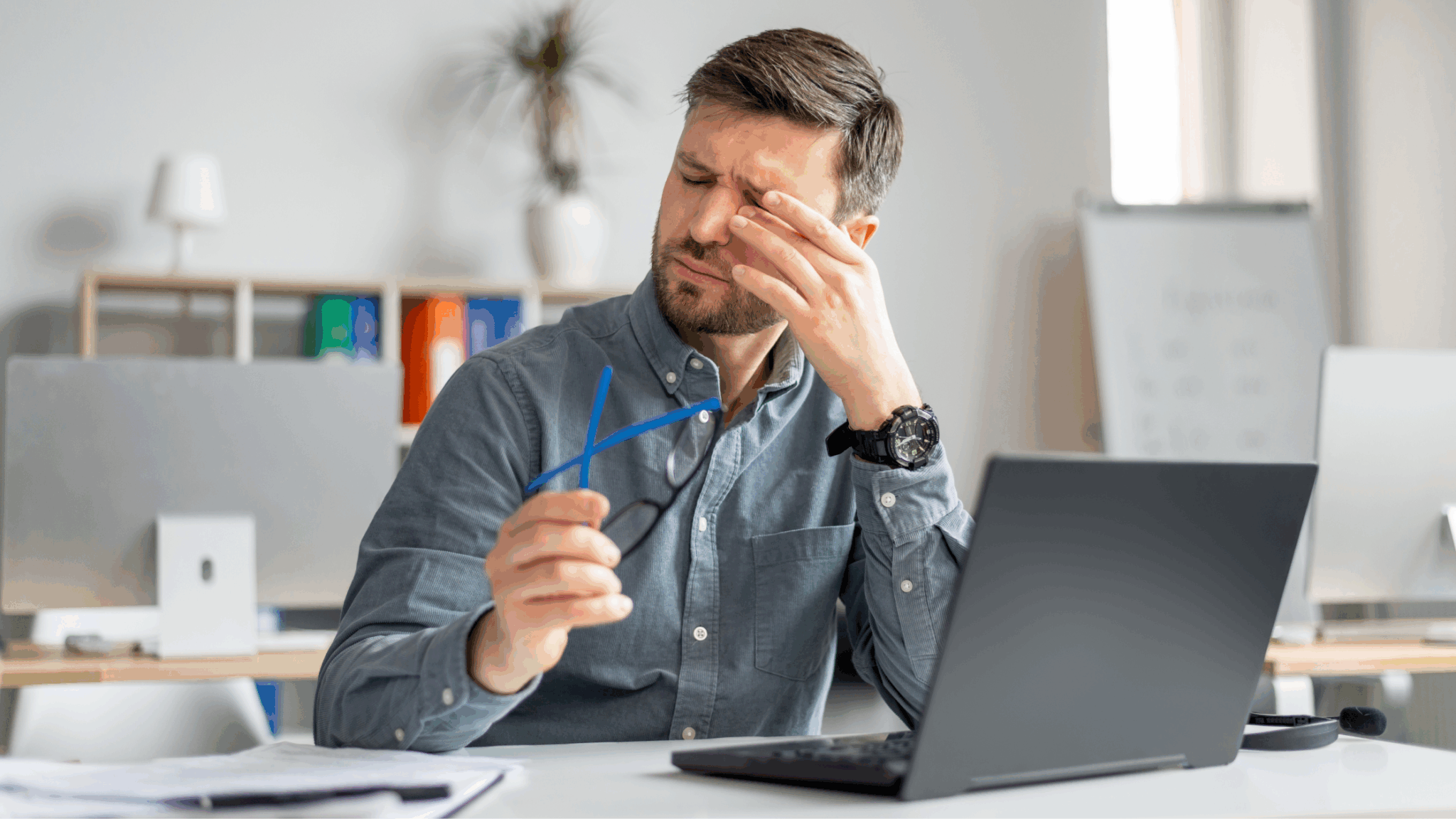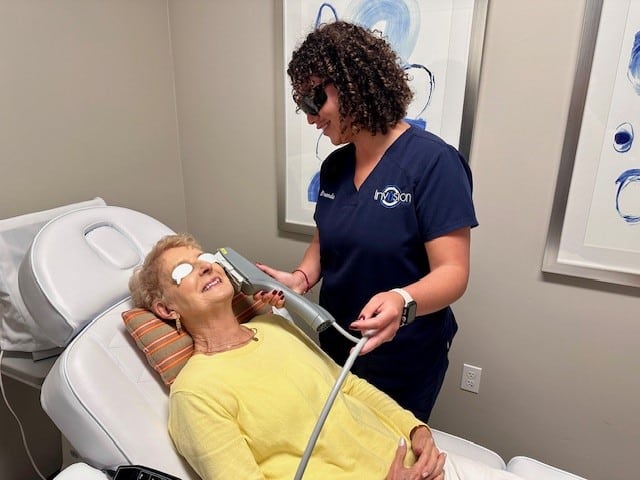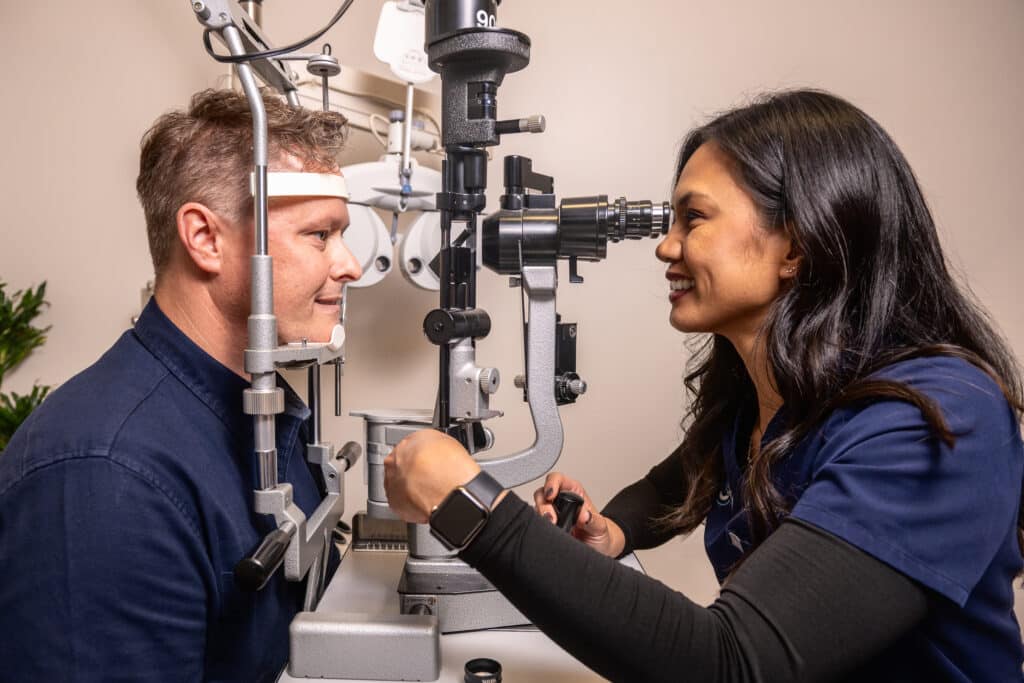Understanding Meibomian Gland Dysfunction (MGD) And How It’s Treated
Posted by: Invision Optometry in Category Dry Eye Management

Dry, burning, irritated, or watery eyes are more than just an annoyance—they can impact everything from reading and driving to enjoying time outdoors. One of the most common causes of these symptoms is Meibomian Gland Dysfunction (MGD). The good news? With the right care, this condition is very manageable. Let’s take a closer look at what MGD is, why it happens, and how you can find relief.
What Is Meibomian Gland Dysfunction?
Your eyelids have rows of tiny oil glands, called meibomian glands, located within the upper and lower eyelids. These glands release protective oils into your tears, which help keep them from evaporating too quickly.
When they become clogged, inflamed, or stop producing enough oil, the balance of your tear film is disrupted. This leaves your eyes more exposed and less comfortable, leading to dry eye symptoms like burning, light sensitivity, blurred vision, or irritation.
There are two main types of dry eye:
- Aqueous Deficient Dry Eye (ADDE): This occurs when your eyes don’t produce enough of the watery part of your tears.
- Evaporative Dry Eye (EDE): This happens when the tear film evaporates too quickly—most often due to Meibomian Gland Dysfunction.
Many people experience a mix of both, but MGD is the most common cause of dry eye overall.

What Causes MGD?
There isn’t one single cause of Meibomian Gland Dysfunction. Instead, several factors can contribute to its development:
- Age-related changes
- The glands tend to lose efficiency and structure with age.
- Contact lens wear
- Long-term use can affect gland structure and function.
- Hormonal changes
- Particularly during menopause, hormones influence tear and oil production.
- Skin conditions
- Rosacea, blepharitis, and other inflammatory conditions can impact gland health.
- Environmental and lifestyle habits
- Screen time reduces blinking, which stresses the glands. Exposure to dry or windy environments may also worsen symptoms.
- Certain medications
- Accutane/acne meds, allergy meds, etc.
- Systemic diseases
- Autoimmune diseases such as Sjogrens Syndrome and Rheumatoid Arthritis.
- Genetics
- Some people are more prone to developing MGD.
Since MGD often develops gradually, many people don’t realize they have it until symptoms become disruptive.
Can MGD Be Cured?
Currently, MGD cannot be “cured” in the sense of being permanently eliminated. However, it can be effectively managed. With consistent care, many patients notice a significant reduction in symptoms, improved comfort, and better quality of life.
Think of managing MGD like caring for your dental health—it requires regular attention, but the results are well worth it.

How Is MGD Treated?
Treatment for Meibomian Gland Dysfunction is focused on restoring gland function and reducing inflammation, therefore stabilizing the tear film. Your eye doctor will recommend a plan based on the severity of your condition. Some of the most common approaches include:
- A heat mask
- Applying warmth helps soften and loosen blockages in the glands.
- Over the counter or prescription eyedrops and ointments
- These may be prescribed to reduce inflammation or improve tear quality.
- In-office treatments
- Advanced procedures such as Intense Pulsed Light (IPL), Lipiflow, Low Level Light Therapy (LLLT) or other technologies are designed to reduce inflammation, unclog glands, and restore healthy oil flow. These treatments often provide longer-lasting relief than at-home care alone.
- Daily eyelid hygiene
- Cleansing the eyelid margins can reduce buildup of debris and bacteria that interfere with gland function.
- Lifestyle adjustments
- Taking regular screen breaks, staying well hydrated, and avoiding smoky or overly dry environments can all help.
Because every patient’s eyes are unique, developing a personalized treatment plan is essential for long-term success.
Does Diet Affect MGD?
Yes, nutrition plays a supporting role in managing MGD and dry eye. A diet rich in Omega-3 fatty acids can improve the quality of oils your glands produce. Foods such as salmon, sardines, flaxseeds, chia seeds, and walnuts are excellent sources.
Additional steps you can take include:
- Drinking enough water
- Staying hydrated supports healthy tear production
- Eating a balanced diet
- Fruits, vegetables, and whole grains provide antioxidants that protect eye tissues.
- Limiting processed foods
- Reducing excess sugars and unhealthy fats can help minimize inflammation.
While diet alone won’t reverse MGD, it can be an important part of a comprehensive care plan.

Why A Professional Dry Eye Evaluation Matters
Because MGD often develops slowly, it’s not always easy to recognize on your own. A dry eye evaluation allows us to look closely at your eyelids, tear film, and meibomian glands using advanced diagnostic tools.
During this visit, we will:
- Assess your symptoms and how they impact your daily life.
- Examine and image your meibomian glands to check for blockages, loss of function, or loss of glands.
- Image and evaluate your tear quality and stability.
- Recommend a personalized treatment plan that may include at-home care, prescription options, or advanced in-office therapies.
This thorough approach helps us get to the root of your symptoms and provide long-term solutions, not just temporary fixes.
The Bottom Line
Meibomian Gland Dysfunction is one of the leading causes of dry eye, but you don’t have to live with the discomfort. With the right diagnosis, professional care, and consistent follow-up, you can protect your eyes and find real long-lasting relief.
If you’re experiencing dry, irritated, or watery eyes, schedule a dry eye evaluation with us today at 619.222.2020. Together, we’ll uncover the underlying cause of your symptoms and help you get back to seeing and feeling your best.


